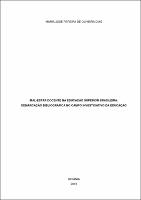| Compartilhamento |


|
Use este identificador para citar ou linkar para este item:
http://tede2.pucgoias.edu.br:8080/handle/tede/1131Registro completo de metadados
| Campo DC | Valor | Idioma |
|---|---|---|
| dc.creator | Dias, Maria José Pereira de Oliveira | - |
| dc.creator.Lattes | http://lattes.cnpq.br/6024677461586835 | por |
| dc.contributor.advisor1 | Baldino, José Maria | - |
| dc.contributor.advisor1Lattes | http://buscatextual.cnpq.br/buscatextual/controladorbuscacv | por |
| dc.contributor.referee1 | Siqueira, Teresa Cristina Barbo | - |
| dc.contributor.referee1Lattes | http://lattes.cnpq.br/7957583668480004 | por |
| dc.contributor.referee2 | Alves, Amone Inácia | - |
| dc.contributor.referee2Lattes | http://lattes.cnpq.br/4562850692564105 | por |
| dc.date.accessioned | 2016-07-27T13:53:22Z | - |
| dc.date.available | 2015-09-01 | - |
| dc.date.issued | 2015-06-12 | - |
| dc.identifier.citation | DIAS, Maria José Pereira de Oliveira. Uneasiness on Professors at the Academy Brazilian: bibliographic demarcation in the investigative field of education.. 2015. 126 f. Dissertação (Mestrado em Ciências Humanas) - Pontifícia Universidade Católica de Goiás, GOIÂNIA, 2015. | por |
| dc.identifier.uri | http://localhost:8080/tede/handle/tede/1131 | - |
| dc.description.resumo | Nesta dissertação, propõe-se a indagar sobre quais referências embasam os estudos acerca do Mal-Estar Docente Universitário no quadro das reconfigurações educacionais formatadas pelas orientações políticas neoliberais. Trata-se de um estudo exploratório de natureza crítico-qualitativo aportado em fontes teóricobibliográficas emoldurantes da problematização temática, expressão das sociedades contemporâneas. Recorreu-se às contribuições de Weber (1864-1920), Freud (2006), Déjours (1992), Birman (1999), Zaragoza (1999), Benedito et al. (1995) e Trein e Rodrigues (2011). Perquiriu-se também o Banco de Teses e Dissertações da Capes, o BDTD e os Periódicos RBE-Anped, Cedes, Cadernos de Pesquisas-Fundação Carlos Chagas-SP, Em Aberto- MEC-INEP, referentes ao período de 2000 a 2014, utilizando-se os filtros Mal-Estar, Mal-Estar Docente e Mal- Estar Docente Universitário. Questões importantes foram reveladas, entre elas, o número de trabalhos é maior sobre Mal-Estar Docente e menor quanto ao Mal-Estar Docente Universitário, o que denota uma temática pouco investigada. O seu caráter é interdisciplinar, perpassando as áreas da Educação, Psicanálise, Sociologia, Psicologia e Administração. Das palavras-chave recorrentes como Mal-Estar Docente na Educação Superior, Mal-Estar na Academia, Trabalho Docente, Precarização, Estresse Ocupacional, Trabalho Solitário, Produtivismo, sinalizam para o Mal-Estar Social. As perspectivas de transformação coletiva abstraem dos Professores a sua responsabilização como individualidade. Por isso fez-se alusão política à poética Meditação XVII, de John Donne, inspiradora de Ernest Hemingway no filme Por quem os sinos dobram? Por nós todos! | por |
| dc.description.abstract | In this thesis, it is proposed to inquire about references which underlie the studies on the Uneasiness on Professors at the Academy in the context of educational reconfigurations formatted by neoliberal political orientations. It is an exploratory study of critical and qualitative nature contributed in focused theoretical and bibliographical sources of thematic questioning, expression of contemporary societies. We resorted to Weber s contributions (1864-1920), Freud (2006), Dejours (1992), Birman (1999), Zaragoza (1999), Benedict et al. (1995) and Trein and Roberts (2011).It also investigated meticulousnessly the Data of Thesis and Dissertations of Capes, the BDTD and RBE Journal - Anped, Cedes, books Research - Carlos Chagas Foundation-SP Plano Abrir - MEC-INEP, for the period of 2000-2014 using If the uneasiness teaching, Uneasiness Teaching and Professor Uneasiness. Important questions were revealed, among them, the number of jobs is greater for Uneasiness Teaching and less about the Uneasiness Professor Teaching, which denotes a subject little investigated. Its character is interdisciplinary, traversing the areas of Education, Psychoanalysis, Sociology, Psychology and Business Administration. The appellants keywords like Uneasiness Teaching in Higher Education, Uneasiness at the Academy, Teaching Work, Precarious, Occupational Stress, Work Alone, Productivism, signal to the Uneasiness Social Welfare. The prospects for collective transformation abstract Professor their accountability as individuality. It made allusion to political to the poetic Meditation XVII by John Donne, inspired Ernest Hemingway in the film For Whom the Bell Tolls? For all of us! | eng |
| dc.description.provenance | Made available in DSpace on 2016-07-27T13:53:22Z (GMT). No. of bitstreams: 1 MARIA JOSE PEREIRA DE OLIVEIRA DIAS.pdf: 824225 bytes, checksum: d5f4c04f1aff876470a0346c6997dc45 (MD5) Previous issue date: 2015-06-12 | eng |
| dc.format | application/pdf | por |
| dc.thumbnail.url | http://localhost:8080/tede/retrieve/4278/MARIA%20JOSE%20PEREIRA%20DE%20OLIVEIRA%20DIAS.pdf.jpg | * |
| dc.language | por | por |
| dc.publisher | Pontifícia Universidade Católica de Goiás | por |
| dc.publisher.department | Ciências Humanas | por |
| dc.publisher.country | BR | por |
| dc.publisher.initials | PUC Goiás | por |
| dc.publisher.program | Educação | por |
| dc.rights | Acesso Aberto | por |
| dc.subject | Mal-Estar | por |
| dc.subject | Mal-Estar Docente | por |
| dc.subject | Mal-Estar Docente Universitário | por |
| dc.subject | Precarização | por |
| dc.subject | Ansiedade e Sofrimento | por |
| dc.subject | Uneasiness | eng |
| dc.subject | Uneasiness Teaching | eng |
| dc.subject | Uneasiness on Professors at the Academy | eng |
| dc.subject | Precarious | eng |
| dc.subject | Anxiety and Grief | eng |
| dc.subject.cnpq | CNPQ::CIENCIAS HUMANAS::EDUCACAO | por |
| dc.title | MAL-ESTAR DOCENTE NA EDUCAÇÃO SUPERIOR BRASILEIRA: DEMARCAÇÃO BIBLIOGRÁFICA NO CAMPO INVESTIGATIVO DA EDUCAÇÃO. | por |
| dc.title.alternative | Uneasiness on Professors at the Academy Brazilian: bibliographic demarcation in the investigative field of education. | eng |
| dc.type | Dissertação | por |
| Aparece nas coleções: | Mestrado em Educação | |
Arquivos associados a este item:
| Arquivo | Descrição | Tamanho | Formato | |
|---|---|---|---|---|
| MARIA JOSE PEREIRA DE OLIVEIRA DIAS.pdf | 804,91 kB | Adobe PDF |  Baixar/Abrir Pré-Visualizar |
Os itens no repositório estão protegidos por copyright, com todos os direitos reservados, salvo quando é indicado o contrário.




